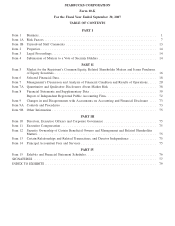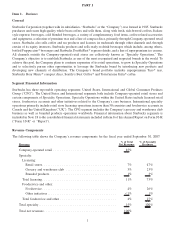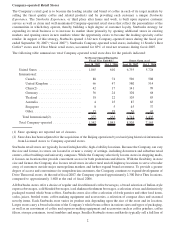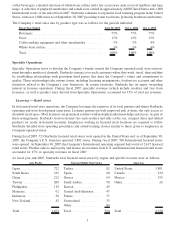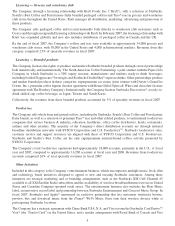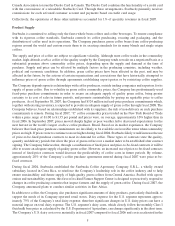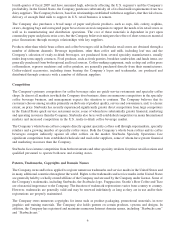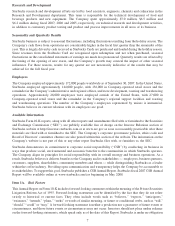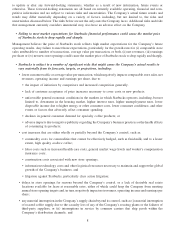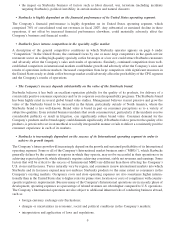Starbucks 2007 Annual Report Download - page 12
Download and view the complete annual report
Please find page 12 of the 2007 Starbucks annual report below. You can navigate through the pages in the report by either clicking on the pages listed below, or by using the keyword search tool below to find specific information within the annual report.• restrictive actions of foreign or United States governmental authorities affecting trade and foreign invest-
ment, including protective measures such as export and customs duties and tariffs and restrictions on the
level of foreign ownership;
• import or other business licensing requirements;
• the enforceability of intellectual property and contract rights;
• limitations on the repatriation of funds and foreign currency exchange restrictions;
• lower levels of consumer spending on a per capita basis than in the United States;
• difficulty in staffing, developing and managing foreign operations, including ensuring the consistency of
product quality and service, due to distance, language and cultural differences; and
• local laws that make it more expensive and complex to negotiate with, retain or terminate employees.
•The China market is important to the Company’s long-term growth prospects - doing business there
and in other developing countries can be challenging.
Starbucks expects the People’s Republic of China to be its largest market outside of the United States. The
Company’s growing investments in its China operations will increase the Company’s exposure in this market. Any
significant or prolonged deterioration in U.S.-China relations might adversely affect the Company’s China business.
Many of the risks and uncertainties of doing business in China are solely within the control of the Chinese
government. China’s government regulates the business conducted by Starbucks by restricting the scope of the
Company’s foreign investments within China and the food and beverage, retail, wholesale and distribution business
conducted within China. Although management believes it has structured the Company’s China operations to
comply with local laws, there are substantial uncertainties regarding the interpretation and application of laws and
regulations and the enforceability of intellectual property and contract rights in China. If China’s governmental
authorities were ultimately to conclude that Starbucks has not complied with one or more existing or future laws or
regulations, or if their interpretations of those laws or regulations were to change over time, the Company’s affiliates
could be subject to fines and other financial penalties, prohibited from opening new stores or forced to cease
operations entirely. Moreover, any inability of the Company to enforce its intellectual property and contract rights in
China’s courts could adversely affect the Company’s business.
Additionally, Starbucks plans to continue entering selected markets in other developing countries, and has recently
entered Russia as an important part of the projected growth of the International operating segment. Some of those
markets pose legal and business challenges similar to the China market, such as substantial uncertainty regarding
the interpretation and application of laws and regulations and the enforceability of intellectual property and contract
rights.
•The Company’s earnings and business growth strategy depends in large part on the success of its busi-
ness partners and suppliers, and the Company’s reputation may be harmed by actions taken by third
parties that are outside of the Company’s control.
The Company’s growth strategy, including its plans for new stores, foodservice, branded products and other
initiatives, relies significantly on a variety of licensee and partnership relationships, particularly in its International
markets. Licensees are often authorized to use the Starbucks logo and provide Starbucks-branded beverages, food
and other products directly to customers. The Company provides training and support to, and monitors the
operations of, these business partners, but the product quality and service they deliver to Starbucks customers may
be diminished by any number of factors beyond the Company’s control. Management believes customers expect the
same quality of products and service from the Company’s licensees as they do from Starbucks and the Company
strives to ensure customers have the same experience whether they visit a Company-operated or licensed store. Any
shortcoming of a Starbucks business partner, particularly an issue affecting the quality of the service experience or
the safety of beverages or food, may be attributed by customers to Starbucks, thus damaging the Company’s
reputation and brand value and potentially affecting the results of operations.
10


